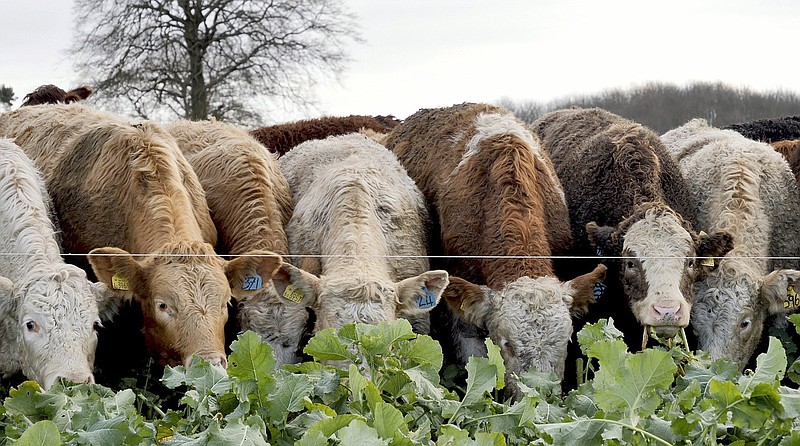LONDON -- The British government is racing to avert shortages of meat, poultry and packaged foods amid a crisis in the food processing industry triggered by soaring energy costs.
Business Secretary Kwasi Kwarteng said Tuesday that he hopes to reach a deal with the U.K.'s primary supplier of food-grade carbon dioxide to restore supplies of the gas that is used to stun animals before slaughter, preserve fruits and vegetables before packaging and put the fizz into carbonated beverages. Kwarteng is in talks with CF Industries, which halted operations at its U.K. plants last week because of high natural gas prices.
"We're hopeful that we can get something sorted today and get the production up and running in the next few days," Kwarteng told the BBC. "It may come at some cost. We're still hammering out details. We're still looking at a plan."
Four small energy providers have failed in recent months, and the U.K. government is in talks with larger firms to ensure that gas and electricity keeps flowing to customers this winter if any other suppliers collapse.
The squeeze on Britain's food processing industry is among the most visible effects of a spike in natural gas prices as the global economy recovers from the covid-19 pandemic -- increasing demand for energy. Wholesale gas prices have tripled this year in Britain.
The government is also under pressure to protect consumers from spiraling energy costs at a time when the fallout from the pandemic is already putting British household budgets under strain.
Energy prices for many consumers are set to rise next month after regulators approved a 12% increase in the price cap for 15 million customers who don't have long-term contracts. That comes after Britain's annual inflation rate jumped to 4.1% last month, the highest in almost a decade.
In addition, the Conservative government is preparing to end two programs that have cushioned the economic impact of the recession. A temporary $27.40 a week increase in public benefit payments and a program under which the government subsidized the wages of millions of workers during the pandemic are both being phased out at the end of this month.
"Now heating bills are going to go up and that's going to affect millions of people across the country," said Ed Davey, leader of the Liberal Democrats, who are holding their annual party conference this week. "What I want to see from the government is action on that. What are they doing to help people on low incomes?"
CF, which generates carbon dioxide as a byproduct of making fertilizer, announced Sept. 15 that it was halting production at two plants in the U.K. The company said it had no estimate for when production would resume.
Kwarteng said the government is discussing a range of options to bolster carbon dioxide supplies, including subsidizing production at CF.
Unless there's a deal soon, shoppers will begin to notice shortages "in about 10 days," said Ian Wright, chief executive officer of the Food and Drink Federation.
The just-in-time supply system that underpins both supermarkets and the hospitality industry "is under the most strain it has ever been in the 40 years it has been there," Wright told the BBC. "It is a real crisis."
Poultry and pork production are likely to begin declining by the end of this week.
Richard Griffiths, chief executive of the British Poultry Council, said 20 million birds are grown and slaughtered each week, the majority of which are chickens.
"It will be a real challenge if there is a shortage of CO2 to the point that slaughterhouses cannot process the birds,″ he said. "That is really the worst-case scenario, which is why we are so hopeful that the government can step in here."
Staffing shortages across U.K. slaughterhouses have left pig farms crammed with 95,000 extra animals, and the looming carbon-dioxide crunch could make the problem even worse.
Farmers are using any spare accommodations available to house the animals, from cattle barns to potato storage sheds, said Zoe Davies, CEO of the National Pig Association. But the fix isn't a long-term solution and a range of factors hitting the industry at once -- from Brexit to the pandemic to shortage of the gas -- have created a "perfect storm" of bad conditions, she said.
Nick Allen, CEO of the British Meat Processors Association, told Bloomberg TV on Monday that 80% of pigs and poultry in the U.K. are slaughtered using CO2 and there is little scope to change the process for hogs as it's considered the most humane method.
"If we lose CO2 then we won't be able to operate and the consequence will be those animals end up staying on the farm. It's almost unthinkable," Allen said. "In the worst-case scenario, if the CO2 dries up, about four or five days after that the shelves will be empty of British pork and British poultry. It is that quick."
Information for this article was contributed by Danica Kirka of The Associated Press and by Megan Durisin of Bloomberg News (WPNS).
